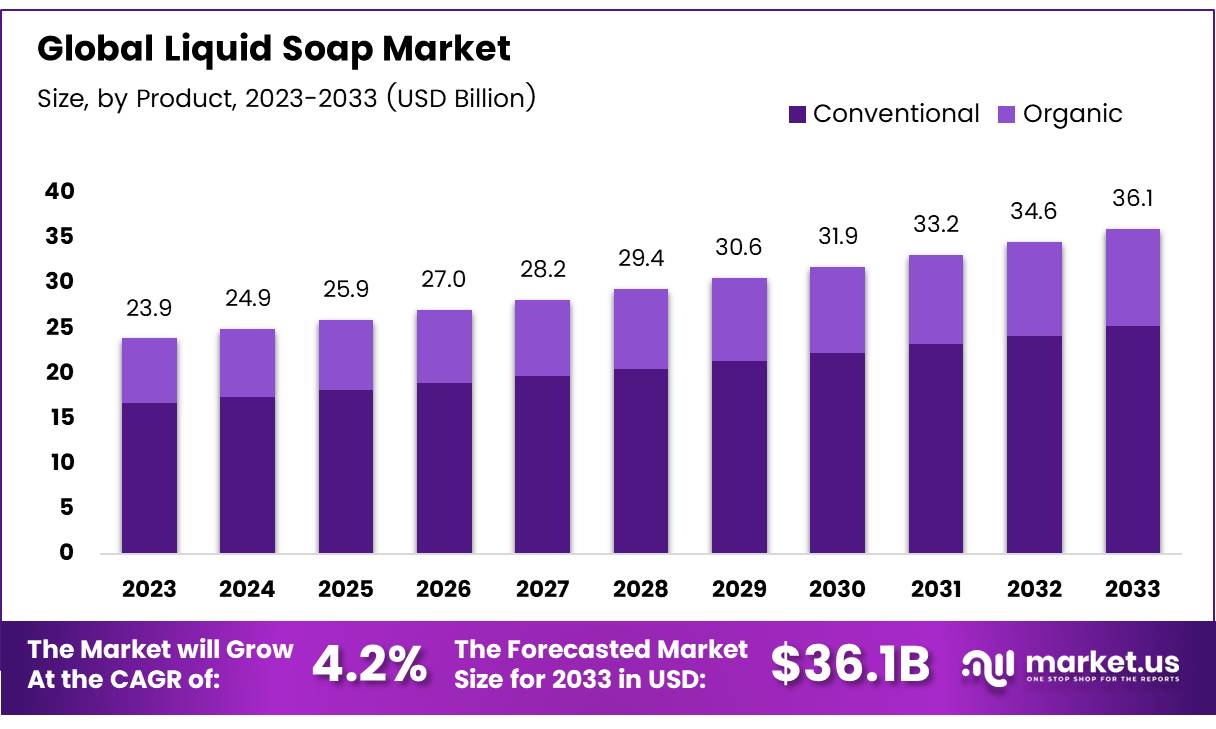Table of Contents
Introduction
The Global Liquid Soap Market is poised for robust expansion, expected to reach USD 36.1 billion by 2033 from USD 23.9 billion in 2023, growing at a CAGR of 4.2%. The industry’s growth reflects the global emphasis on hygiene, convenience, and sustainability in personal and household care products.
The shift from traditional bar soaps to liquid formulations continues to gain traction, supported by consumer demand for ease of use, effective cleansing, and premium-quality products. Moreover, innovations in eco-friendly and organic formulations have diversified product offerings, appealing to environmentally aware consumers.
Additionally, rising public health initiatives and global sanitation programs are fueling market expansion, especially in developing economies. Manufacturers are focusing on recyclable packaging and natural ingredients to address growing regulatory and environmental concerns.

Key Takeaways
- The global liquid soap market is projected to reach USD 36.1 billion by 2033, growing at a CAGR of 4.2% from 2024 to 2033.
- Conventional liquid soaps held a dominant market share of 72% in 2023, driven by affordability and consumer familiarity.
- Bath & Body Soaps led the product type segment with a 60% market share in 2023, owing to widespread use in personal care.
- Hypermarkets & Supermarkets dominated the distribution channel segment in 2023, offering wide product variety and affordability.
- The household end-use segment held the largest market share in 2023, fueled by daily cleaning and hygiene needs.
- Asia Pacific dominated in 2023 with a 37% share, valued at USD 8.8 billion, driven by urbanization and hygiene awareness.
Market Segmentation Overview
By Product – The Conventional segment accounted for 72% of the market in 2023 due to its affordability and accessibility. Consumers continue to prefer these variants for everyday hygiene, while the organic segment grows steadily, supported by eco-conscious preferences and sustainable innovation.
By Product Type – The Bath & Body Soaps segment dominated with a 60% share, reflecting consumer preference for moisturizing and fragrant cleansing solutions. The category benefits from premiumization trends and rising personal care awareness, particularly in urban and middle-income demographics.
By Distribution Channel – Hypermarkets & Supermarkets remained the leading channels in 2023, providing easy accessibility and wide assortment. However, e-commerce is rapidly gaining ground as consumers favor online convenience and wider product comparisons.
By End Use – The Household segment continued to dominate in 2023, accounting for the largest market share. This growth stems from increased hygiene awareness, diverse product availability, and strong use cases in daily cleaning, handwashing, and bathing applications.
Drivers
1. Rising Hygiene Awareness: The global emphasis on health and sanitation, reinforced by the COVID-19 pandemic, continues to propel liquid soap demand. Consumers increasingly value hygiene solutions that are both effective and skin-friendly, fostering widespread adoption across households and institutions.
2. Shift Toward Natural Formulations: The move toward organic and plant-based ingredients is accelerating. Consumers are actively choosing products free from parabens, sulfates, and artificial additives, encouraging brands to innovate with sustainable, biodegradable formulations that enhance brand loyalty and market share.
Use Cases
1. Personal Care and Hygiene: Liquid soaps are integral to modern hygiene routines, including handwashing and bathing. Their ease of use and gentle formulations make them ideal for daily use, reducing bacterial transmission and enhancing skin protection across all demographics.
2. Commercial and Institutional Cleaning: In commercial settings—such as hospitals, restaurants, and schools—liquid soaps are essential for maintaining sanitation standards. Their compatibility with dispensers and large-scale packaging options makes them cost-effective and convenient for public hygiene maintenance.
Major Challenges
1. Environmental Impact of Packaging: The widespread use of plastic bottles poses a sustainability challenge. While liquid soaps offer superior convenience, the environmental cost of single-use packaging continues to affect brand perception and regulatory compliance, pushing manufacturers toward recyclable and refillable solutions.
2. High Market Competition: The liquid soap industry faces intense competition from both established multinationals and regional brands. Price sensitivity among consumers, coupled with brand saturation, makes differentiation through formulation, scent, and eco-labeling increasingly critical to sustain profitability.
Business Opportunities
1. Expansion in Emerging Markets: Rapid urbanization and growing disposable incomes in regions like Asia Pacific, Africa, and Latin America offer substantial potential. Increased awareness of hygiene and access to affordable liquid soap products will expand the consumer base in these developing economies.
2. Product Innovation and Premiumization: Brands can capture new market segments by introducing specialized formulations, such as antibacterial, moisturizing, or dermatologically tested products. Additionally, refillable packaging and concentrated formats present sustainable opportunities for value-driven differentiation.
Regional Analysis
1. Asia Pacific Dominance: Asia Pacific accounted for 37% of the market, valued at USD 8.8 billion in 2023. Rapid population growth, urbanization, and hygiene awareness in China, India, and Southeast Asia are driving strong demand for both mass-market and premium liquid soaps.
2. Growth in North America and Europe: North America exhibits robust adoption of organic and dermatologically tested soaps, while Europe’s demand is fueled by sustainability regulations and eco-friendly innovations. Both regions continue to focus on premium personal care and ethical consumerism.
Recent Developments
- August 2023: Dettol launched the 5L Pro Cleanse Liquid Hand Wash targeting professional and commercial applications, enhancing large-scale hygiene coverage.
- July 2022: Godrej introduced an eco-friendly Ready-to-Mix Body Wash under the “Magic” line, supporting affordability and sustainability initiatives.
- December 2024: Bids were invited for the acquisition of Eucliptate Alcohol and Liquid Soap, signaling potential market consolidation in the hygiene segment.
- December 2024: Wipro Consumer Care acquired three soap brands from VVF Ltd to strengthen its personal care portfolio and expand market reach.
Conclusion
The Liquid Soap Market continues to evolve as hygiene, sustainability, and convenience converge to shape global consumer behavior. With innovation driving organic and eco-conscious product offerings, and government initiatives promoting public health, the industry is well-positioned for sustained growth through 2033. Strategic focus on packaging sustainability, digital distribution, and emerging markets will remain pivotal in defining future success.
Discuss your needs with our analyst
Please share your requirements with more details so our analyst can check if they can solve your problem(s)



